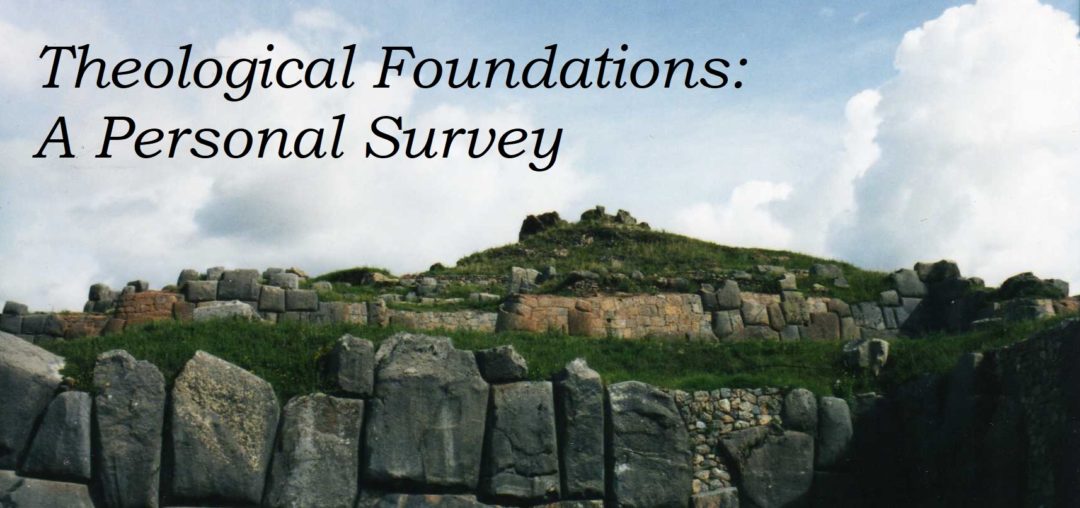A note on this series: I am currently writing a six-chapter report on my Capstone Project for my seminary degree in Social Transformation. I have been working on this project, in various forms, for the last three years and this report is the culmination of all that work. One of the chapters I must include covers the “theological foundations” for my project, and I realized that it is a perfect fit for this space. This series of five posts will be a “rough draft” of sorts of that chapter.
I have mentioned in passing a few times two elements of my journey out of fundamentalist Christianity and toward a progressive, loving faith. The first is how I deeply struggled to reconcile my values with my religion, and ultimately decided that if Christianity and my values — things like feminism, affirming queer people– conflicted, that it was going to be Christianity that got the boot. Obviously, since I’m still a professing Christian and even did one of the most Christian-y things one can do and went to seminary, I decided they did not conflict. The second element I’ve mentioned from time to time is how Christianity is commonly understood as being a “motivation” for advocating for progressive values. I think we run into this idea a lot– abolitionists were motivated by their Christian faith, Martin Luther King Jr. was inspired to engage in the Civil Rights Movement because of his Christian faith, etc.
What I have not often seen examined is what do these things actually mean. What do I mean when I say that Christianity can be practiced and understood to have a place for feminism, for affirming all queer people? What does it mean that Christianity inspires me to advocate for civil rights, for justice, for peace, for restoration and and repentance and liberation? What are the theological foundations for my work, exactly? How do those foundations affect what I build on them, like this project?
Another important part of this conversation is what it means to be “inspired” by and “motivated” by religion when engaging in areas of our culture that are public, secular, and political. We’ve seen this sort of motivation go absolutely haywire in the US– “Christianity” as commonly practiced by evangelicals and other conservatives is a civic religion* and it’s brought us white supremacist terrorism, chattel slavery and its historical offspring (redlining, Jim Crow, for-profit prisons, police), theocratic authoritarianism in churches and government, brutalities against queer bodies, especially trans women … People have used their “Christian” religion to baptize all sorts of atrocities both individual and communal. It can be very dangerous to be “motivated” by religion, especially a religion that enjoys such an incredible amount of power like Christianity does in my culture.
Clearly, religion playing such a public role in society can be harmful. And while I think there are essential differences between how progressive Christians talk about their faith in public ways, we’re not immune to these types of problems. It’s also critical to remember that even if I am deeply informed by my faith practice, that it shapes how I interact with society, I must respect public spaces and other people. I cannot assume other people are Christian– or even religious–and part of “freedom of religion” is freedom from religion; pushing people’s boundaries and expectations around religion is not always appropriate. Jesus encouraged all of us to “pray in private,” after all.
There’s a tension here, however. Is it alright for presidential candidates to speak on what their Christianity asks of them as public servants on a debate stage? What about in a private interview, or when they’re directly asked about it? If I’m giving oral testimony in a legislature committee hearing, can I quote a compelling biblical passage? If I’m writing a letter to my representative, or calling their office, should I reference our shared Christian faith and ask them to vote according to my understanding of its principles? What about brief mentions during PTA meetings, or homeowners associations, or when volunteering for non-profits? I joined #NeverAgainAction a few weeks ago to help shut down ICE headquarters in DC, and some of us who were arrested talked openly about our faith for hours: how we struggle with it, how it’s harmed us, and how it can heal us, too … and I could not help but reflect on Paul and Silas singing hymns in prison. Several people said afterward how participating in that conversation, in the context of sitting in jail for protesting concentration camps, was deeply restorative to them even though they do not consider themselves particularly religious.
The reality is that while most of my faith exists below the surface and it rarely ever explicitly comes up in my public work as an activist and policy advocate, I have been indelibly molded by it. My experiences with Christianity and my appreciation for Jesus’ ministry continue to evolve, as well as inform my point of view. I fight for women’s rights and LGBT+ rights and reproductive rights because I am a Christian. I am anti-racist because I am a Christian. I am a lobbyist for children’s rights and protections because I am a Christian. My Christianity shines a light on my path toward wholeness, healing, and liberation–and it provides the nudge I occasionally need to keep going.
*an excellent resource to understand this concept better is Migrations of the Holy by Cavanaugh.

